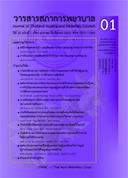Psychiatric Nurses’ Roles in Preventing Facebook Addiction in Adolescents
Keywords:
facebook addiction, adolescents, prevention, psychiatric nurses’ rolesAbstract
Abstract:
Facebook addiction is found in an increasing number of adolescents. However,no serious attention has been paid to this addiction. Unaware of the situation, healthcare personnel may assume that this addiction is a normal adolescent behaviour that is likely to stop when they grow older. Such an assumption could result in inappropriate care given to adolescent Facebook addicts and escalation of the severity of their addiction, a situation that may affect their studies, physical and mental health, and performance of their social roles. Therefore, psychiatric nurses play an important role in preventing Facebook addiction in adolescents, especially those with a high addiction risk. It is suggested that nurses cooperate with parents and teachers to provide proper education for adolescents. This article discusses Facebook addiction in terms of: its defnition; its mechanisms; its effects; its evaluation; and roles of psychiatric nurses in preventing it. It is expected
that this article will provide psychiatric nurses with basic knowledge of monitoring, preventing, and reducing risks of Facebook addiction
Downloads
References
1. Customer insight. Thailand facebook users insights 2018. Bangkok: Customer insight; 2019. (in Thai)
2. Boyd DM, Ellison NB. Social network site: defnition, history and scholarship. J Comput Mediat Commun.
2007;13:210-30.
3. Gul H, Solmaz AY, Gul A, Oner O. Facebook overuse and addiction among Turkish adolescents: are ADHD
and ADHD-related problems risk factors?. Psychiat Clin Psych. 2018;28(1):80-90.
4. Mahajan R. Addicted to facebook: role of narcissism and self-esteem. Int Multidiscip Res J. 2015;5(10):159-65.29
5. Jafarkarimi H, Hiang Sim AT, Saadatdoost R, Hee JM. Facebook addiction among Malaysian students. Int Inform Educ Technol J. 2016;6(6):465-9.
6. Pholphet K, Tuntasood B. Self-esteem and facebook addicted of high school students in Bangkok metropolitan
area. Journal of the Psychiatric Association of Thailand.2016; 61(3): 217-30. (in Thai)
7. Chittiwan S, Sukanich P. Relationship between facebook addiction and abnormal eating attitudes and behaviors among female adolescents in Patumthani province, Thailand. Journal of the Psychiatric Association of Thailand. 2016;62(2):117-28. (in Thai)
8. Kajai C, Thapinta D, Skulphan S. The relationship between facebook addiction and depression among
adolescents attending state university in Chiang Mai province. The Southern College Network Journal of Nursing and Public Health. 2018;5(2):57-69. (in Thai)
9. Blachnio A, Przepiorka A, Pantic I. Association between facebook addiction, self-esteem and life satisfaction: a cross-sectional study. Comput Human Behav. 2016;55:701-5.
10. Ellison NB, Steinfeld C, Lampe C. The benefts of facebook friends: social capital and college students’
use of online social network sites. J Comput Mediat Commun. 2007;12(4):1143-68.
11. Andreassen CS, Torsheim T, Brunborg GS, Pallesen S. Development of a Facebook Addiction Scale.
Psychol Rep. 2012;110(2):501-17.
12. He Q, Turel O, Bechara A. Brain anatomy alterations associated with social networking site (SNS) addiction.
Sci Rep. 2017;7:1-25.
13. Liu M, Luo J. Relationship between peripheral blood dopamine level and internet addiction disorder in
adolescents: a pilot study. Int J Clin Exp Med. 2015;8(6):9943-8.
14. Wutikul Y, Rodmanee S, Visalboon P. Facbook addiction and effect on mental health in youth. Journal of The Police Nurses. 2018;10(2):452-60. (in Thai)
15. Jorgenson AG, Hsiao RCJ, Yen CF. Internet addiction and other behavioral addictions. Child Adolesc Psychiatr
Clin N Am. 2016;25(3):509-20.16.
16. Valkenburg PM, Peter J, Schouten AP. Friend networking sites and their relationship to adolescents’ well-being
and social self-esteem. Cyberpsychol Behav. 2006; 9(5):584-90.
17. Niea J, Zhanga W, Liuc Y. Exploring depression, self-esteem and verbal fluency with different degrees
of internet addiction among Chinese college students. Compr Psychiatry. 2016;72:114-20.
18. Wolniczak I, Caceres-DelAguila JA, Palma-Ardiles G, Arroyo KJ, Solis-Visscher R, Paredes-Yauri S,
et al. Association between facebook dependence and poor sleep quality: a study in a sample of undergraduate students in Peru. PloS One. 2013;8(3):1-14.
19. Wonganantnont P. Excessive internet usage behavioral in adolescents. Journal of The Royal Thai Army Nurses.
2014;15(2):173-87. (in Thai)
20. Nateesatidtarn B. Behaviours and impacts of using the internet as a learning tool in Singburi school.
Pathumthani University Academic Journal. 2017; 9(2):175-8. (in Thai)
21. Anantapong K, Pitanupong J. The facebook effect on prince of Songkla university students. Songklanagarind
Medical Journal. 2014;32(6):393-404. (in Thai)
22. Glover J, Fritsch SL. Kid sanxiety and social media: a review. Child Adolesc PsychiatrClin N Am.
2018;27(2):171-82.
23. Keeffe GS, Pearson KC. Clinical report the impact of social media on children, adolescents, and families. J Pediatr. 2011;127(4):800-30.30
24. Phanasathit M, Manwong M, Hanprathet N, Khumsri J, Yingyeun R. Validation of the Thai version of
Bergen Facebook Addiction Scale (Thai-BFAS). J Psychiatr Assoc Thailand. 2015;98 (Suppl 2): S108-17.
25. Hong FY, Huang DH, Lin HY, Chiu SL. Analysis of the psychological traits, facebook usage, and
facebook addiction model of Taiwanese university students. Telemat Inform. 2014;31(4):597-606.
26. Young KS. Internet addiction: the emergence of a new clinical disorder. Cyberpsychol Behav.
1988;3:237-44.
27. Vondrackova P, Gabrhelik R. Prevention of internet addiction: a systematic review. J Behav Addict.
2016;5(4):568-79.
28. Berber CC. Educational intervention for reducing internet addiction tendencies. Turk J Addict. 2016; 3(3):175-86.
29. Pronnoppadol C, Hongsanguansri S, Pitayaratstian N, Kiatrungrit K, Pavasuthiapaisit C. Advice for
parents on internet use of children and adolescents. Bangkok: Mediazone Printing.; 2017. (in Thai)
30. Wieland DM. Internet addiction: opportunities for assessment and treatment by psychiatric-mental health
nurses. J Psychosoc Nurs Ment Health Serv. 2014; 52(7):3-5.
31. Chareonwanit S. Game addiction behavior: impacts and prevntions. Thai Journal of Science and Technology.
2014;22(6):871-9. (in Thai)
32. Tanathip G, Kulnapadol P. The effect of cognitive group therapy to facbook system stickness of high-school
students. Research Methodology & Cognitive Science. 2015;13(1):108-17. (in Thai)
33. Soron TR. Successful management of facebook addiction in Bangladesh: a case report. J Psychiatry. 2015;
18(2):1-3.
34. Wieland DM. Psychiatric-mental health nurses’ exposure to clients with problematic internet experiences:
a mixed-methods pilot study. J Psychosoc Nurs Ment Health Serv. 2015 53(10):31-40.








